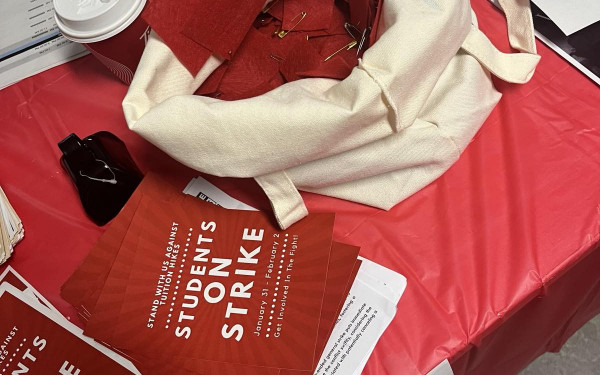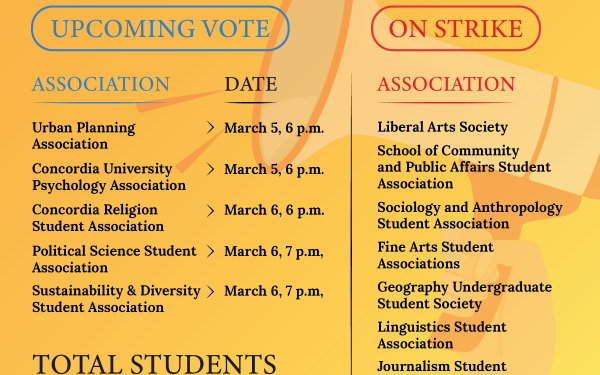CSU hosts town hall to discuss proposed Quebec tuition hikes
Unions on campus gather together with students to talk about recent increase in tuition
On Oct. 26, the Concordia Student Union (CSU) hosted a town hall to discuss the tuition hikes recently proposed by the Quebec government.
The event was held from 11 a.m. to 1 p.m. and was led by CSU General Coordinator Harley Martin, CSU Academic Coordinator Alexandrah Cardona. In attendance on the panel were also Arts and Science Federation of Associations (ASFA) Mobilization Coordinator Lily Charette, and School of Community and Public Affairs member Adam Semergian. The event covered a variety of student concerns, with a particular focus on what student mobilization on this issue may look like in the coming months.
The proposed tuition hikes would force out-of-province students to pay a minimum of $17,000 per semester. In addition, universities will have to pay $20,000 to the government per international student enrolled. Most importantly, the Quebec government would expect institutions to charge above the minimum to make up for any potential losses—out-of-province and international students could end up paying closer to $30,000 per year minimum as admissions drop. Additionally, while these measures would not initially affect students who are already enrolled, actions like a degree or faculty change may force an already-enrolled student to pay higher prices.
Semergian, kicked off the event with a brief history of the student movement in Quebec, which has been active since as early as the 1960s.
“A very common thread in all of this has been for free tuition or to end tuition hikes,” said Semergian. The largest of these movements took place in 2012 when province-wide tuition increases were protested by students from both francophone and anglophone campuses. Student strikes lasted for months and eventually forced the government to rescind their proposal for higher tuition.
“For years there has been a fight in Quebec for free education,” said Cardona. “This tuition increase is just another wave in the government trying to combat that movement.”
Semergian also cautioned against the possibility of student division. “Remember that just because right now [the tuition hikes] don’t affect in-province students […] this is probably just a preamble to something that would affect everybody.”
Charette agreed. “It’s very intentional that these increases in tuition are being done in a way that brings in language politics,” she said. “It deeply confuses the situation and is going to create so many rifts between communities […] They’re hoping to divide the student movement in Quebec.”
Furthermore, tuition increases have wide-ranging impacts on Concordia as an institution. Cardona told students, “Concordia is projecting, on the conservative side, that we would lose enrollment by up to 60 per cent [...] Funding-wise, Concordia would be looking at losing upwards of tens of millions of dollars per year.”
Cardona also pointed out that programs that attract mostly out-of-province students will be disproportionately affected. Fine arts, including studio arts— as well as the aerospace and engineering programs—are looking at especially devastating losses.
“This is a first step in trying to coordinate our actions,” said Charette. Going forward, large unions like the CSU and ASFA are looking to smaller, department-level student associations to make their voices heard. According to Charette, because a general assembly to vote on a strike mandate for the CSU would require upwards of 450 students to appear in-person and vote, smaller student associations have a better chance of getting mobilization started in earnest.
While this may sound intimidating, student associations certainly wouldn’t be working alone. Cardona assured students that the CSU intends to assist with coordination, funding, and communication going forward. Additionally, according to Becca Wilgosh, who represented CREW-CSN, most of Concordia’s labour unions are nearing the end of their negotiations with the university, which would allow them to legally strike. “This is a key moment for solidarity between labour unions and student unions,” she said.
A full-on student strike is likely impossible, however, until at least the winter semester. This is due to scheduling and communication constraints. In the meantime, Cardona encouraged students to get acquainted with their department-level student associations and agitate for action against the tuition hikes.
“The more students say, ‘Why aren’t we striking about this? We should do this,’ [it] gives more power to us to start planning and coordinating those kinds of actions,” Charette said.
The CSU is now endorsing a protest on Monday, Oct. 30. It is set to begin in Dorchester Square at 1 p.m., and students will march to McGill’s Roddick Gates. There is also a teach-in on the history of the Quebec student movement on Nov. 16, as well as a petition available on CSU social media this week to bring this issue before the National Assembly.
A previous version of this article stated that the townhall was organized by the CSU, ASFA and La Crues. The townhall was organized solely by the CSU. In addition, Adam Semergian was named as an executive of La Crues. However, he is a member of the School of Community and Public Affairs. The Link regrets these errors.





_600_375_90_s_c1.jpg)

